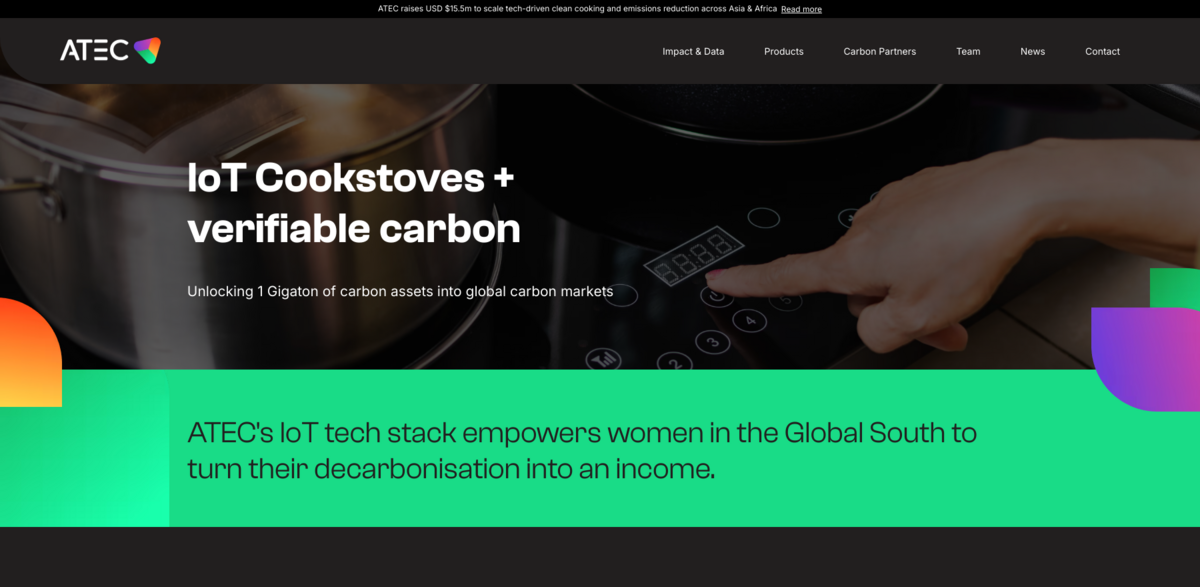What is ATEC’s Clean Cooking Initiative?
ATEC is shaking up the clean cooking scene with a fresh, tech-driven approach. They’ve just raised a whopping USD $15.5 million to scale their smart clean cookstoves, known as eCook, across Asia and Africa. These aren’t your average stoves — they’re IoT-enabled electric cookstoves that connect households directly to global carbon markets. The magic? Each stove generates data-auditable carbon credits, verified right down to the individual household, and integrated with carbon blockchain ledgers. Over the next three years, ATEC plans to roll out up to 200,000 of these stoves, focusing on countries like Bangladesh, Cambodia, Malawi, and Nepal. Plus, they’re expanding manufacturing and growing their carbon partner network to cement their leadership in next-gen carbon data.
The Main Benefits of ATEC’s Technology
Here’s why ATEC’s work matters — and the numbers tell the story:
- One-third of the world still cooks with wood, charcoal, or other polluting fuels.
- These dirty cooking methods cause 3.2 million premature deaths annually, mostly women and children.
- Cooking with polluting fuels emits 1 gigaton of CO2 every year — more than the entire global airline industry.
- ATEC has already distributed over 25,000 clean cooking appliances across the Global South.
- The new funding will enable the rollout of up to 200,000 IoT electric cookstoves over three years.
- ATEC taps into an estimated USD $16 billion-a-year carbon credit market by providing precise, real-time emissions data.
How ATEC’s Data-Driven Approach Stands Out
Unlike many carbon projects that rely on rough estimates, ATEC’s system is built on 100% IoT data infrastructure. This means every bit of energy usage and emissions avoidance is measured in real-time for each household. They then combine this data with the latest independent scientific research to boost the accuracy of carbon calculations. It’s all about trust and transparency — making sure every carbon credit generated is backed by solid, verifiable data. This approach is a game-changer for carbon markets, especially as buyers demand more scientific, data-driven emission reductions.
Funding and Partnerships Powering Growth
ATEC’s recent $15.5 million raise isn’t just a number — it’s a catalyst for growth. The funding will help increase the supply of carbon credits, supporting partners like ENGIE, the KliK Foundation, myclimate, and Livelihoods Funds in hitting their climate goals with confidence. These partnerships are crucial, as they bring together expertise and resources to scale ATEC’s impact. Investors see ATEC’s model as a rare blend of scalable impact and practical innovation, combining technology with a strong business model that rewards users and drives cleaner cooking habits.
ATEC’s Vision and Product Range
Founded in Cambodia in 2016, ATEC has been pioneering clean cooking tech for years. They launched the world’s first PAYG-enabled cookstove in 2018 and followed up with the first IoT-enabled smart stove in 2020. Today, their products reach 10 countries across Asia and Africa. Their flagship offerings include the ATEC Biodigester for off-grid solutions and the eCook induction stoves for on-grid households. Both are made affordable through PAYGO financing, making clean cooking accessible to base-of-pyramid communities. The goal? To become the global leader in clean cooking by 2030 through disruptive technology.
ATEC’s Impact on Sustainable Development Goals
- SDG 1: No Poverty — by reducing fuel costs and health expenses.
- SDG 3: Good Health and Well-being — by eliminating harmful smoke from cooking.
- SDG 7: Affordable and Clean Energy — through accessible electric cooking solutions.
- SDG 13: Climate Action — by cutting down carbon emissions with verified data.
Voices from the Field: What Leaders Say About ATEC
Ben Jeffreys, ATEC’s CEO & Co-Founder, puts it simply: every family deserves a smoke-free kitchen that doesn’t harm health or trap people in poverty. He emphasizes that unlocking carbon assets with real-time data is key to scaling decarbonisation without losing transparency or trust. Ademidun Edosomwan from Lightrock highlights the critical need for affordable, sustainable energy and praises ATEC’s transparent, verifiable impact in carbon markets. Meanwhile, Melvyn Yeo of TRIREC applauds ATEC’s Cook-To-Earn program for transforming harmful cooking habits and creating a scalable, venture-backable model that benefits both communities and the planet. Together, these voices underline ATEC’s potential to drive transformative change at scale.


















